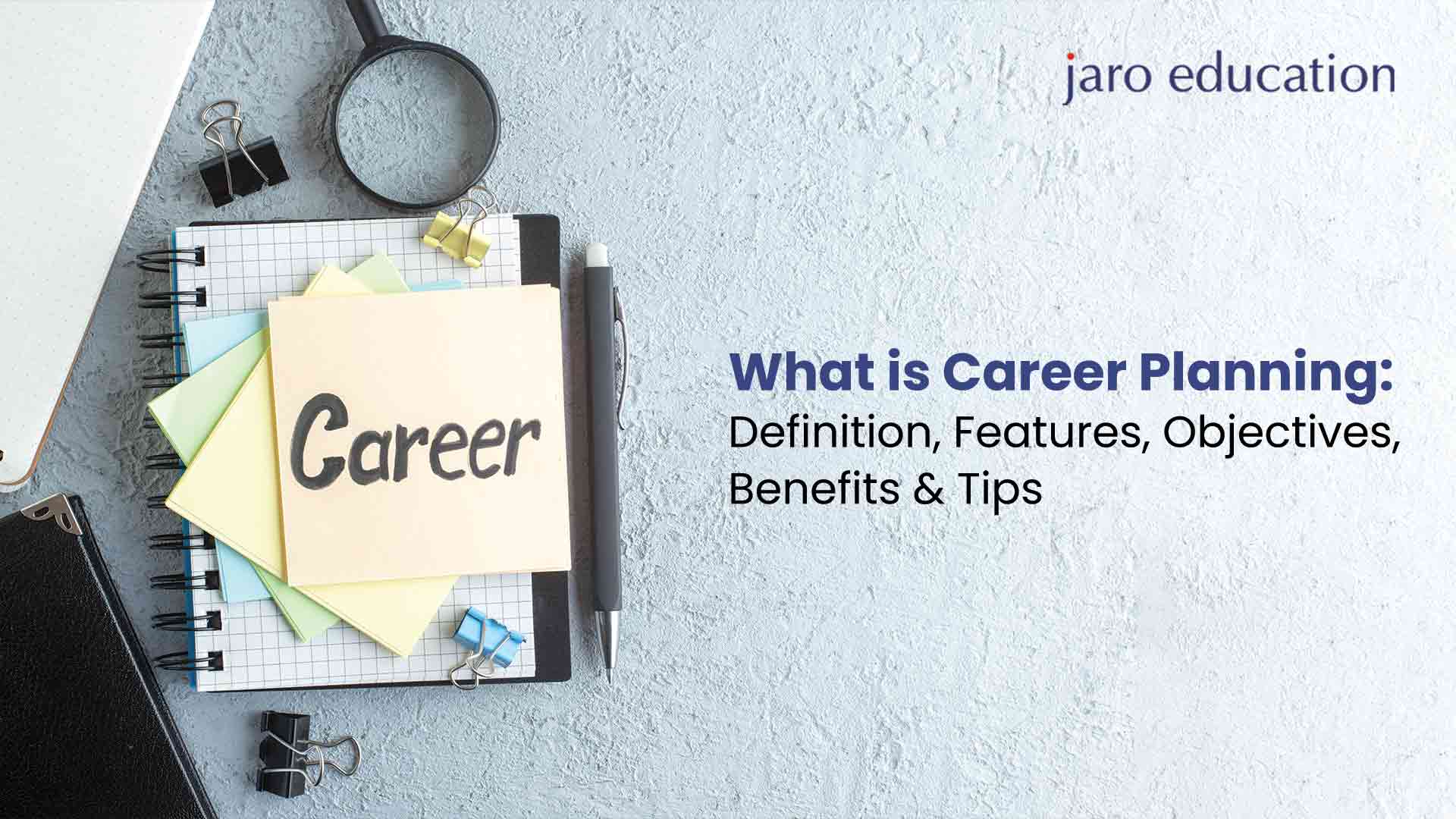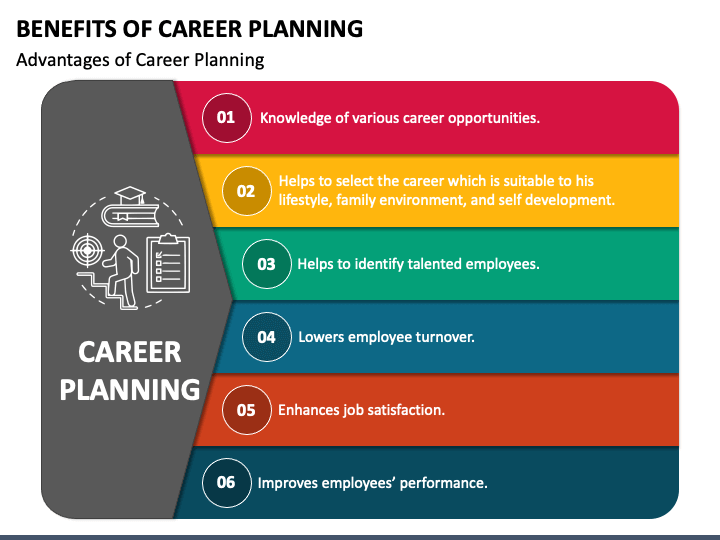What is Career Planning: Understanding Its
Definition, Features, Objectives, Benefits, and Tips
Table of Contents

- jaro education
- 4, June 2024
- 5:20 pm
Career planning is a step-by-step process through which one sets his or her career goals and prepares an actionable plan to realize and achieve them. It involves self-assessment, career exploration, setting goals, and how to achieve the set goals in a very realistic way. That is, career planning properly assists individuals in trying to marry their abilities, interests, and values to their professional aspirations.
It is very important to have effective career planning in the extremely competitive job market today. Fast changes in the field of technology and changing industrial trends enforce professionals to update their skills at regular intervals. Career planning helps one not only to stay focused and motivated but also clearly leads one to be well-prepared to seize opportunities and solve challenges on his or her career path.
Through this blog, the readers will be able to obtain a complete overview of the concept of career planning: definition, characteristic features, purposes, and benefits. Moreover, practice tips and strategies are shared to make the process of career planning effective. Whether you are a new graduate or a mid-career professional thinking of making a change, the tools and knowledge needed to launch and manage a successful career are found in this blog.
What is Career Planning?
Career planning is a strategic process through which individuals identify their career goals and develop a structured plan to achieve them. It involves evaluating one’s skills, interests, and values, exploring career options, setting specific objectives, and creating a roadmap to reach those objectives.
Process Involved in Career Planning:
- Self-assessment: This is carried out on the basis of the evaluation of strengths, weaknesses, skills, interests, and values. It is possible to use tools for carrying out this, namely: personality assessments, skills inventories, and interest surveys.
- Career Exploration: Research different careers based on the self-assessment findings. Include job duties, skills, education requirements for the job, career prospects for the job, and industry trends.
- Set career goals: Set clear, realistic, and achievable career goals derived from your research and self-assessment. Set both short-term and long-term goals.
- Develop an action plan: Create a detailed outline of what needs to be done for your goals to be accomplished. This may involve further education or training, gaining experience, and building a professional network.
- Implementation of the Plan: Do things in the direction of your career goals by applying for employment, seeking mentorship, attending workshops, and improving skills.
- Review and Adjust: Periodically revisit your career plan to assess your progress and make revisions where necessary. Career planning is dynamic, a lifelong process that changes with experience and new insights.
Importance of Having a Career Plan:
Having a career plan is crucial for several reasons:
- Clarity and Direction: A career plan provides a clear path and direction, helping you focus on your professional goals and avoid distractions.
- Motivation and Focus: With defined goals and a roadmap to achieve them, you stay motivated and focused, which enhances your productivity and job satisfaction.
- Adaptability: A career plan allows you to anticipate changes in the job market and adapt accordingly. It helps you stay proactive in acquiring new skills and seizing opportunities.
- Decision-Making: A well-thought-out career plan aids in making informed career decisions, whether it’s choosing a job, pursuing further education, or switching career paths.
- Career Success: Ultimately, a career plan increases your chances of career success by ensuring that your efforts are aligned with your long-term professional aspirations.
What are the Features of Career Planning?
Career planning involves several key features that help individuals navigate their professional journey effectively. From self-assessment and goal setting to thorough research and strategic decision-making, these elements are crucial for creating a successful career roadmap.
Self-Assessment
Self-assessment is the foundational step in career planning. It involves a thorough evaluation of your personal attributes, which include:
- Strengths and Weaknesses: Understanding what you excel at and areas where you need improvement. For example, you might have strong analytical skills but need to work on public speaking.
- Skills: Identifying both hard skills (technical abilities) and soft skills (interpersonal abilities). Hard skills might include programming or financial analysis, while soft skills could be leadership or teamwork.
- Interests: Recognizing what you are passionate about and what types of activities or roles you enjoy. This might include interests in technology, healthcare, education, etc.
Tools such as personality tests (e.g., Myers-Briggs Type Indicator), skills inventories, and interest assessments can be very helpful in this process. These tools can provide insights into potential career paths that align with your personal attributes.
Goal Setting
Setting clear and attainable goals is crucial for effective career planning. This involves:
- Short-term Goals: Objectives that can be achieved within a short period, typically within a year. Examples include gaining specific skills through courses, completing a certification program, or securing an entry-level position in your desired field.
- Long-term Goals: Objectives that take several years to achieve and often involve significant career milestones. Examples include reaching a managerial position, transitioning to a different industry, or achieving financial independence through career success.
- When setting goals, it’s important to use the SMART criteria—making sure your goals are Specific, Measurable, Achievable, Relevant, and Time-bound.
Research
Conducting thorough research is essential to understanding the landscape of potential career paths. This involves:
- Exploring Career Options: Investigate various industries and roles that align with your self-assessment results. For instance, if you have a background in biology and an interest in healthcare, you might explore roles such as medical research, healthcare administration, or clinical trial management.
- Opportunities: Look for opportunities for growth and advancement within these roles. Research companies that offer career development programs, mentorship, and clear pathways for promotion.
- Industry Trends: Stay updated with trends and changes in the job market to identify future opportunities and threats. For example, understanding the impact of automation on certain jobs can help you prepare and pivot if necessary.
Decision Making
Effective decision-making is a critical feature of career planning. This involves:
- Analyzing Options: Weighing the pros and cons of different career paths based on your research and self-assessment. Consider factors like job satisfaction, salary potential, work-life balance, and job security.
- Aligning with Goals: Ensuring that the chosen career path aligns with your short-term and long-term goals. For instance, if your long-term goal is to become a CFO, your short-term goals should include gaining experience in finance and accounting roles.
- Evaluating Feasibility: Considering the feasibility of your choices based on your current situation, resources, and constraints. For example, if you need additional education or training to pursue a certain career, assess whether you can afford the time and financial investment.
Action Plan
Developing a detailed action plan is necessary to achieve your career goals. This involves:
- Step-by-Step Plan: Creating a roadmap with specific, actionable steps to reach your goals. This might include:
- Education and Training: Enrolling in courses or programs to acquire necessary skills and qualifications. For example, taking a coding boot camp if you want to transition into a tech career.
- Experience: Gaining relevant experience through internships, volunteer work, or entry-level positions. For example, working as a teaching assistant if you aim to become a professor.
- Networking: Build your professional relationships and mentors, through whom you can acquire better opportunities. Attend as many industry conferences as possible and become a member of professional associations. Network with professionals on a platform like LinkedIn.
- Job applications: Actively apply for a job that relates to your future career perspectives and prepare for interviews. Tailor your resume and cover letter for each position you apply for and indicate relevant skills and experience.
- Timelines and Milestones: Setting deadlines for each step and establishing milestones to track your progress. For instance, setting a goal to complete a certification course within six months or to secure a new job within a year.
- Regular Review and Adjustment: Periodically review your action plan to assess progress and make necessary adjustments based on new insights or changes in your career environment. For example, if you discover a new emerging field that interests you, you might adjust your plan to include gaining relevant skills and experience in that area.
By following these features of career planning, you can create a comprehensive and adaptable plan that guides you toward your career aspirations.

*sketchbubble
Objectives of Career Planning
Career planning serves multiple objectives aimed at guiding individuals toward a successful and fulfilling professional life. These objectives include personal and professional growth, job satisfaction, financial stability, work-life balance, and adaptability to changing job market trends.
Personal and Professional Growth
Career planning is essential for fostering personal and professional growth. By setting clear, achievable goals, individuals can pursue continuous learning and development. This growth encompasses acquiring new skills, gaining valuable experiences, and expanding knowledge in one’s field. Personal growth might involve enhancing soft skills like communication, leadership, and time management, while professional growth could include obtaining certifications, advancing education, and gaining practical experience. This dual growth enhances overall competence, confidence, and readiness for advanced roles and responsibilities.
Job Satisfaction and Fulfillment
Achieving job satisfaction and fulfillment is a core objective of career planning. When career choices align with personal interests, values, and strengths, work becomes more enjoyable and meaningful. This alignment leads to higher engagement, motivation, and productivity, resulting in greater job satisfaction. Fulfillment comes from knowing that your work contributes to personal goals and societal needs. Career planning helps identify and pursue roles that match your passion and purpose, leading to a more gratifying professional life.
Financial Stability and Growth
Financial stability and growth are crucial objectives of career planning. By setting and working towards career goals, individuals can secure better job positions and negotiate higher salaries. This financial growth ensures a steady and increasing income, contributing to long-term financial security. Career planning includes strategies for salary negotiations, identifying high-paying industries, and exploring opportunities for advancement. Financial stability allows individuals to meet their personal and family needs, invest in future goals, and enjoy a comfortable lifestyle.
Work-Life Balance
Maintaining a healthy work-life balance is an important objective of career planning. A well-structured career plan helps individuals manage their time effectively, balancing professional responsibilities with personal life. By setting realistic career goals and developing a plan that accommodates personal needs, individuals can reduce stress and prevent burnout. Achieving work-life balance ensures that individuals have time for family, hobbies, relaxation, and self-care, contributing to overall well-being and a more fulfilling life.
Adaptability to Changing Job Market Trends
Adaptability to changing job market trends is a vital objective of career planning. The job market is dynamic, with new technologies, industries, and roles emerging regularly. Career planning helps individuals stay informed about industry trends and changes, allowing them to adapt their skills and career strategies accordingly. This adaptability involves continuous learning, networking, and staying updated with market demands. Being adaptable ensures that individuals remain competitive, resilient, and prepared for shifts in the job market, securing their career longevity and success.
Benefits of Career Planning
Career planning offers numerous advantages that can significantly impact your professional journey. From providing clear direction and enhancing motivation to improving decision-making skills and increasing job satisfaction, effective career planning is essential for achieving career success and advancement.
Clear Career Direction and Focus
Career planning provides a clear direction and focus for your professional journey. By identifying specific career goals and developing a roadmap to achieve them, you can navigate your career path with greater clarity and purpose. This focused approach helps you prioritize your efforts, avoid distractions, and make informed decisions that align with your long-term objectives.
Increased Motivation and Productivity
Having a well-defined career plan boosts motivation and productivity. Knowing what you want to achieve and having a plan to get there keeps you motivated to take actionable steps toward your goals. This motivation translates into higher productivity as you work efficiently to complete tasks and achieve milestones that bring you closer to your desired career outcomes.
Better Decision-Making Skills
Career planning enhances your decision-making skills by providing a structured framework for evaluating options. With a clear understanding of your goals, strengths, and opportunities, you can make more informed choices about education, job opportunities, and career changes. This systematic approach reduces uncertainty and helps you make decisions that are aligned with your career aspirations.
Enhanced Job Satisfaction and Career Fulfillment
One of the significant benefits of career planning is increased job satisfaction and career fulfillment. By aligning your career path with your interests, values, and strengths, you are more likely to find work that is meaningful and enjoyable. This alignment leads to greater job satisfaction as you engage in work that resonates with you and fulfills your professional and personal goals.
Greater Chances of Career Success and Advancement
Career planning, in an extraordinary way, raises the probability of success and moving ahead in your career. A well-thought-out career plan makes you visualize growth and development. Proper improvement of your skills and relevant experience should put you in a good place for promotion and advancement in your chosen field. This way, you do not miss out on the opportunities to achieve your career ambitions and successes from your professional efforts.
Tips for Effective Career Planning
Effective career planning involves strategic actions and continuous self-improvement to achieve your professional goals. By regularly assessing your progress, setting realistic goals, and staying updated with industry trends, you can navigate your career path successfully and seize new opportunities.
Regular Self-Assessment and Reflection
Regular self-assessment and reflection are crucial for effective career planning. Periodically evaluate your skills, interests, strengths, and weaknesses to understand how they align with your career goals. Reflect on your career progress, achievements, and areas for improvement. This continuous self-assessment helps you stay on track and make necessary adjustments to your career plan.
Setting Realistic and Achievable Goals
Ensure that your long-term career goal is disaggregated into smaller, short-term goals that are realistic and achievable, and that will keep you motivated. Further, make sure that the set goals are Specific, Measurable, Achievable, Relevant, and Time-bound (SMART) so that you can be in a better position to monitor your progress and finally have something to celebrate as small wins.
Continuous Learning and Skill Development
Skill building through courses of education and training in the constantly evolving market is indispensable. Invest in your education and training programs for the acquisition of new skills and knowledge for your field. Keep aware of trends, technologies, and best practices in your industry. In doing so, one is then committed to lifelong learning, hence enhancing employability while remaining competitive in his or her career.
Networking and Building Professional Relationships
Networking and professional acquaintances are two major parts of professional planning. Attend as many professional meetings, seminars, and social networking events as possible to get to know your peers, mentors, and prospective employers. Become an active member of professional groups and social media groups in the industry. Strongly nurtured and strong professional relationships can give you access to good information, support, and even a chance for professional growth.
Seeking Guidance from Mentors and Career Counselors
Mentoring and career counseling can also offer you guidance and support in the area of career planning. Industry-specific mentorship, sharing personal experiences, and feedback on the career plan help to coach you in understanding your strengths and development of career exploration strategies in realizing your goals.
Staying Updated with Industry Trends and Changes
It is very important to keep updated with industry trends and changes in order to fit right into the current changing job market. You might want to subscribe to publications in the industry, follow some thought leaders in that subject, and participate in relevant webinars and workshops. Be aware of current trends and what is projected for the future so that you will be able to anticipate change, identify new opportunities, and realign your career accordingly.
Being Open to New Opportunities and Experiences
Being open to new opportunities and experiences can significantly enhance your career planning. Embrace challenges, take on new responsibilities, and be willing to step outside your comfort zone. Exploring diverse roles and industries can provide valuable experiences, broaden your skill set, and open up new career paths that you might not have considered.
Conclusion
Career planning is a very important process; it is a process that grants the individual the power to go in the right direction on their professional journey. Systematic assessment of your strengths, setting clear goals, and constant adjustment to changes are going to be the ways through which the individual will be able to develop personally and professionally, gain job satisfaction and financial security, and achieve success in their career.
Proactivity in the career planning process equips you to be ready for opportunities and challenges within your professional life. Regular self-assessment, continuous learning, networking, and seeking guidance are key strategies to proactively pursue your objectives and goals.
Good career planning is a process of dedication and effort that goes along the way. Start with realistic goals and an action plan defining how to reach them. Continuously review and adjust the plan to keep your evolving aspirations and market trends intact. Start the career planning process today and take charge of your professional future.












